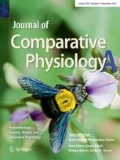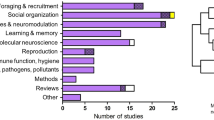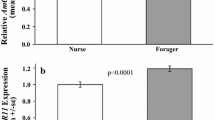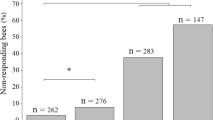Abstract.
The biogenic amine neurochemical octopamine is involved in the onset of foraging behaviour in honey bees. We tested the hypothesis that octopamine influences honey bee behavioural development by modulating responsiveness to task-related stimuli. We examined the effect of octopamine treatment on responsiveness to brood pheromone (an activator of foraging) and to the presence of older bees in the colony (an inhibitor of foraging in young bees). Octopamine treatment increased responsiveness to brood pheromone and decreased responsiveness to social inhibition. These results identify octopamine both as an important source of variation in response thresholds and as a modulator of pheromonal communication in insect societies. We speculate that octopamine plays more than one role in the organisation of behavioural development indicating a very high level of integration between the neurochemical system and the generation of complex behaviour.
Similar content being viewed by others
Author information
Authors and Affiliations
Additional information
Electronic Publication
Rights and permissions
About this article
Cite this article
Barron, .A., Schulz, .D. & Robinson, .G. Octopamine modulates responsiveness to foraging-related stimuli in honey bees (Apis mellifera). J Comp Physiol A 188, 603–610 (2002). https://doi.org/10.1007/s00359-002-0335-5
Accepted:
Issue Date:
DOI: https://doi.org/10.1007/s00359-002-0335-5




